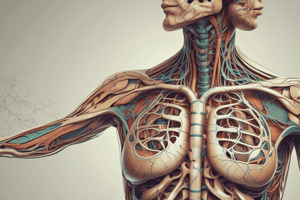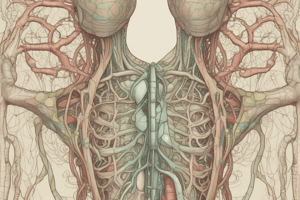Podcast
Questions and Answers
What is one of the main functions of the lymphatic system?
What is one of the main functions of the lymphatic system?
- To absorb oxygen from the air
- To store energy in the form of fat
- To filter and return lymph to the blood (correct)
- To produce hormones
Where is the spleen located?
Where is the spleen located?
- Behind the lungs
- Behind the heart
- Behind the stomach (correct)
- Behind the liver
What is the function of the thymus?
What is the function of the thymus?
- To produce antibodies
- To produce hormones
- To mature immature lymphocytes (correct)
- To filter blood
What is the function of the palatine tonsils?
What is the function of the palatine tonsils?
Where are the pharyngeal tonsils located?
Where are the pharyngeal tonsils located?
What is the composition of lymph fluid?
What is the composition of lymph fluid?
What is the function of Peyer's patches?
What is the function of Peyer's patches?
Where is the appendix located?
Where is the appendix located?
What substances can be found in lymph fluid?
What substances can be found in lymph fluid?
Where are lymphocytes typically found?
Where are lymphocytes typically found?
What is the primary function of lymph nodes?
What is the primary function of lymph nodes?
What is unique about the lymphatic system compared to the cardiovascular system?
What is unique about the lymphatic system compared to the cardiovascular system?
What two factors help facilitate the flow of fluid through the lymphoid vessels?
What two factors help facilitate the flow of fluid through the lymphoid vessels?
What happens to the lymph fluid before it enters the bloodstream?
What happens to the lymph fluid before it enters the bloodstream?
What is one of the primary functions of the lymphatic system?
What is one of the primary functions of the lymphatic system?
How many primary functions does the lymphatic system have?
How many primary functions does the lymphatic system have?
Flashcards are hidden until you start studying
Study Notes
Functions of the Lymphatic System
- Houses and supports the cells of the immune system
- Filters and returns lymph (interstitial fluid) to the blood
- Keeps blood volume constant
- Absorbs fats and fat-soluble vitamins from the intestine and sends them to the blood system
The Spleen
- Located behind the stomach
- Composed of red and white pulp
- Screens blood and breaks down old red blood cells for their iron
- Contains macrophages that can move out into the body in case of infection
The Thymus
- Located behind the sternum
- Part of MALT (Mucosa-Associated Lymphoid Tissue)
- Located on either side of the posterior end of the oral cavity
- Protects against pathogens entering through the throat
Tonsils
Palatine Tonsils
- Located at the back of the mouth
- Small outcropping of the large intestine with nodules of MALT
Pharyngeal Tonsils (Adenoids)
- Located high in the posterior throat
- Nodules of MALT located in the small intestine
- Protect against pathogens entering through the throat
Peyer's Patches
- Located in the small intestine
- Composed of lobules
- Lymphoid organ where immature lymphocytes mature into T lymphocytes
- Exit through blood vessels
Small Intestine
- Large mass of MALT located high in the posterior throat
- Protects against pathogens entering through the throat
Appendix
- Part of the gastrointestinal tract
- Has a number of Peyer's patches
Lymph Fluid
- Composition includes interstitial fluid, proteins, fats, and fat-soluble vitamins
- Absorbed from the intestine and transported to the blood system
Lymphocytes
- Found in lymph nodes, spleen, Peyer's patches, appendix, mucosal surfaces, and tonsils
Lymph Nodes
- Small structures containing lymphatic tissues
- Located along lymphatic routes in prominent areas such as armpits, groin, neck, and knees
- Filter fluid and trap invading cells
Lymphatic System
- A one-way system, lacking a defined pump like the heart
- Flow of fluid through lymphoid vessels relies on the respiratory pump, valves, and skeletal muscle pump
- Lymphatic capillaries pick up excess fluid from tissues and drain into veins near the heart
- Fluid passes through lymphatic nodes that filter the fluid and trap invading cells
- Three primary functions: maintaining fluid balance, facilitating absorption of dietary fats, and enhancing the immune system
Studying That Suits You
Use AI to generate personalized quizzes and flashcards to suit your learning preferences.




